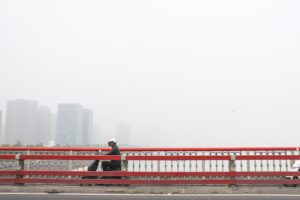
Air pollution kills more than 8 million people a year. And according to data, more than 700,000 children under the age of 5 in 2021. Worldwide, “dirty air” has become the second cause of death, coming after only high blood pressure and overtaking tobacco use.
The State of Global Air Report 2024, a study published this June and compiled with data collected around the globe, paints this grim picture, underscoring the widespread problem. The report highlights how people, especially young children and especially in poorer countries, are, sometimes dramatically, affected by what they breathe by offering a comprehensive analysis of the world’s air and the health impacts of its quality.
According to the research developed in partnership with Unicef, bad air quality is second only to malnutrition as a risk factor for mortality among children below school age. And as for many other indicators, there are significant differences between the different areas of the world. In most parts of Africa, the risk is 100 times higher than in high-income nations.
Commenting on the study and looking at the great inequalities recorded, Pallavi Pant, lead author of the report, said: «Far too much of the burden [is] borne by young children, older population, and low and middle income countries». She was echoed by Kitty van der Heijden, deputy executive director of Unicef, who stated, «Our inaction is having profound effects on the next generation, with lifelong health and wellbeing impacts».
Cars, home appliances and wildfires
In the Western world and developed countries, when discussing air pollution, we tend to think firstly about what we breathe around our cities: the dirty air caused by car use and the burning of fossil fuel produced by factories, for example. But, even though those are undeniably responsible for a significant portion of the quality of what enters our lungs, for many, there are also risks related to indoor air quality.
Let’s remember that, according to the WHO (World Health Organization), pollution is «the contamination of the indoor or outdoor environment by any chemical, physical or biological agent that modifies the natural characteristics of the atmosphere». Comprehensively, this means, among others, also “household combustion devices, motor vehicles, industrial facilities and forest fires.” Activities and tools that all contribute to heightening the public health concerns related to the increased presence of «particulate matter, carbon monoxide, ozone, nitrogen dioxide and sulfur dioxide».
The relationship between air pollution and higher temperatures further worsens the impact of airborne “bad” particles. It enhances the risk of wildfires, for example, and the spread of those particles that contaminate the air. Thus, monitoring the levels of pollutants can benefit the impact that dirty air has on people’s health if the data are used to develop positive actions. Better air can reduce the estimated 2,000 daily deaths of children under five affected directly by the quality of what they breathe inside and outside their homes.
Indoor cooking and gender
In 2021, the death of half a million minors was linked to pollution, in most cases directly related to indoor cooking with dirty fuels. With this in mind, switching to cleaner fuels or appliances could reduce the harmful particles in the air and cut the number of deaths.
In June, the International Energy Agency estimated that four billion dollars yearly from now to 2030 are needed to solve this issue in sub-Saharan Africa alone (as reported by the Guardian.) It is not a simple task for a continent that struggles in many ways. Yet, if tackled, the issue of air pollution can benefit not only the general health of the population but can also specifically improve gender equality.
Do not forget that in most cases, women and young girls in the poorest areas are still often confined to their homes and cook for their families. Thus, they are the most exposed to all the health risks of breathing bad air.
***
Alley Oop’s newsletter
Alley Oop arrives in your inbox every Friday morning with news and stories. To sign up, click here.
If you want to write to or contact Alley Oop’s editorial team, email us at alleyoop@ilsole24ore.com.